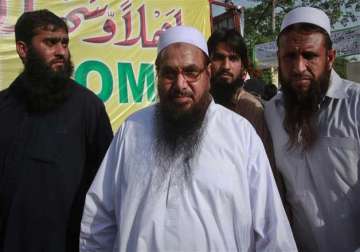Hafiz Saeed appears in public after Pak claim of banning JuD
New Delhi: India's most wanted terrorist Hafiz Saeed recently on Monday inaugurated a free ambulance service launched by Lashkar-e-Taiba's charity wing Jamat-ud-Dawa in the port city of Karachi.Known for its brutal killings and mayhem the

New Delhi: India's most wanted terrorist Hafiz Saeed recently on Monday inaugurated a free ambulance service launched by Lashkar-e-Taiba's charity wing Jamat-ud-Dawa in the port city of Karachi.
Known for its brutal killings and mayhem the group who was behind the Mumbai Attacks in 2008 publicly expanded its operations in an entirely different domain: health care.
Couple of days later a fleet of gleaming new vans, decorated with the charity's distinctive flag and loaded with stretchers still wrapped in plastic, were parked outside the group's Karachi headquarters, waiting to make their first runs to hospitals on this city's often chaotic streets.
The group already operates a similar service across 118 towns and cities in Pakistan, a spokesman for the charity said, and were seeking donations to help fund the new service in Karachi.
After the Taliban's massacre of school children last month, Pakistan is itself experiencing an anti-militant sentiment and this move by the Lashkar's affiliate Jamat-ud-Dawa clearly advocates the fact of the support which these militant organizations get from higher officials.
In fact, some analysts saw the unveiling of the ambulance service this week as a calculated rebuke to speculation that the Pakistani authorities were finally going to enforce international sanctions against Jamaat-ud-Dawa.
The speculation picked up after US Secretary of State John Kerry's trip to Pakistan on January 12. Thereafter a
That speculation picked up after Secretary of State John Kerry's trip to Pakistan on Jan. 12. Afterward, a State Department spokeswoman, Marie Harf, suggested that the officials had promised to ban at least 10 active militant groups. But when Pakistani officials were asked follow-up questions about the issue, it became clear that no new banning was imminent, and some officials said that an internal debate was still underway about which course to follow.
Lashkar-e-Taiba and Jamaat-ud-Dawa insist that the groups are distinct entities with different operations, and many Pakistani officials honor that distinction. But the U.N. Security Council does not, describing Jamaat-ud-Dawa merely as an alias or front for Lashkar on the international sanctions list.
Tasnim Aslam, a spokeswoman for Pakistan's Foreign office said that Pakistan complied with U.N. resolutions against Lashkar-e-Taiba and Jamaat-ud-Dawa in 2008. But she also conceded that Jamaat continued to operate openly in the country. "I am aware that JuD had an ambulance service," she said.
Publicly recasting himself as a charity-minded leader of JuD, Saeed who has a USD 10 million prize on him, accused foreign enemies of plotting against him and using his charity work as a cover for devious aims.
Enjoying the freedom, the terrorist group today operates a network of schools and clinics despite a wave of anti-terror movement in the country after Peshawar attacks.
Analysts suggest that there's a different part of the brain that operates when officials are talking about these groups. The different treatment stems in part from Lashkar's specific vision of jihad - its attacks are mostly aimed at India - and its close ties to Pakistani intelligence, which has a long history of playing favorites with militant groups.
Other groups with similar aims are also flourishing. Posters across Karachi this week advertised a Feb. 5 rally organized by Jaish-e-Muhammad, which was officially banned 13 years ago after its fighters tried to storm the Indian Parliament.
And yet, there are signs that Pakistan's troubled relationship with extreme Islamist groups may be changing somewhat.
Protestors gathered outside of the Red Mosque in Islamabad after Peshawar attacks to yell anti-Taliban slogans and demand the arrest of Maulana Abdul Aziz, the mosque's chief cleric.
The leader of the movement named “reclaim our mosques”, Jibran Nasir said that despite having the small number they would come out again and again and encourage more people to join in.
Still, many Pakistanis remain cowed by the threat posed by the Pakistani Taliban and other jihadi groups, and the authorities have shown little enthusiasm for the protesters' bravery. The Islamabad police have yet to initiate a criminal investigation against Aziz, much less arrest him, Nasir admitted.
Pakistan's military too has showed less determination in their fight against the militant groups including Laskhar-e-Taiba and its allies. Even if army commanders and Pakistani officials had a mind to move against Lashkar, they worry that it might provoke a violent backlash that would destabilize the country.